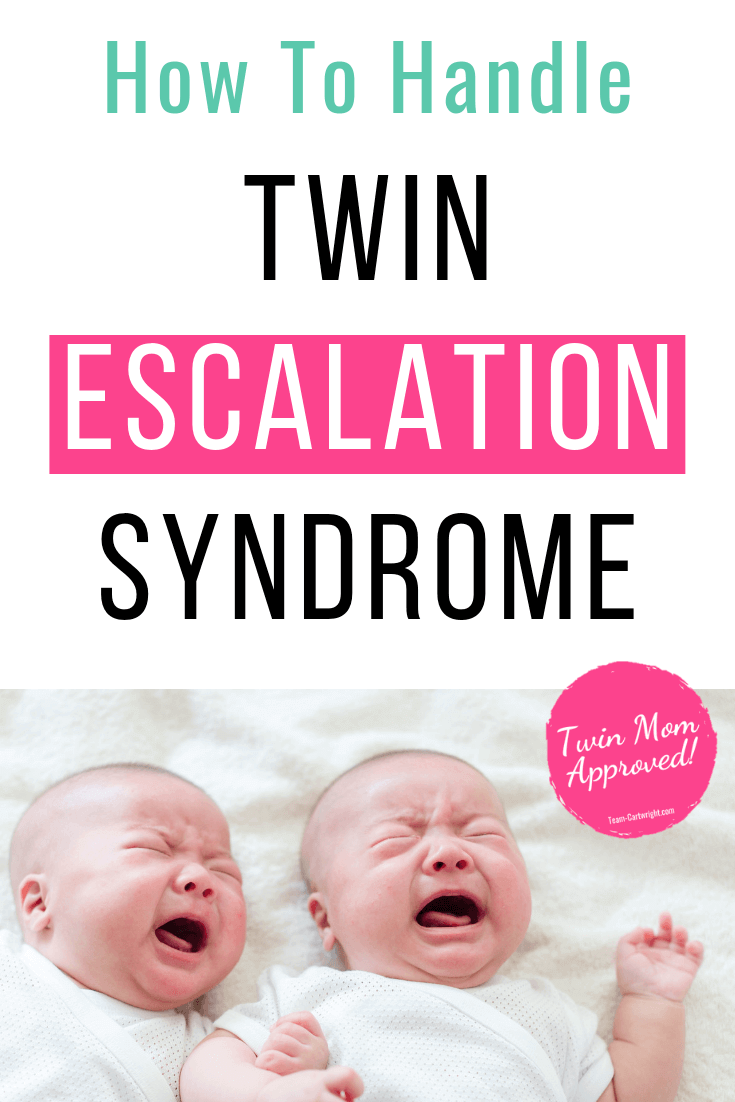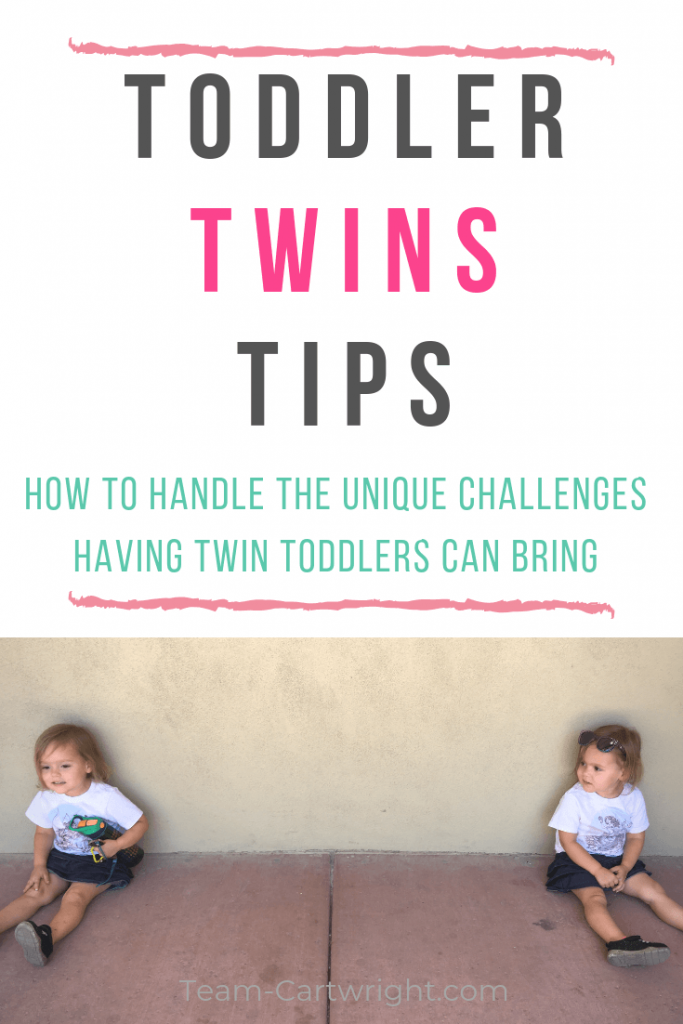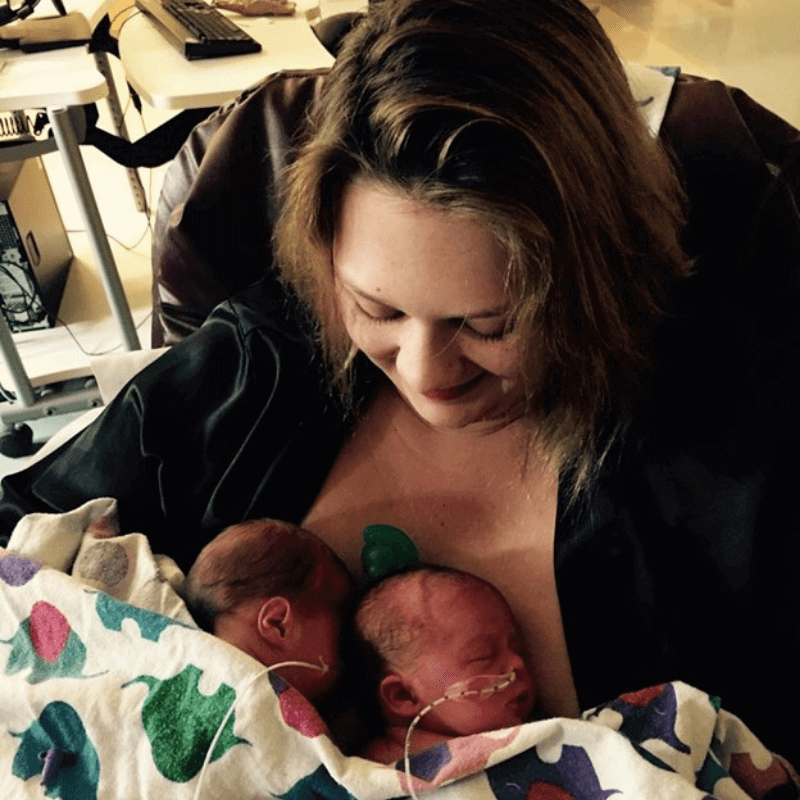Twin Escalation Syndrome
Have you ever had both your twins tantruming or freaking out at the same time? Does it feel like you are dealing with way more than just two babies or toddlers at once?
One child having a tantrum can be stressful, but why does having multiples feel like you have six kids tantruming?
The answer is twin escalation syndrome. You aren’t crazy, twins can rile each other up like nothing else.

What's In This Post?
What is Twin Escalation Syndrome?
Twin escalation syndrome is the phenomena where one twin will start a behavior, then the other twin will start the same behavior. This multiplies exponentially.
Twin escalation syndrome can happen with baby twins, with one twin starting to cry and causing the other to start crying. It continues into the toddler twin years where one twin toddler tantrums, then the other joins in, and yep, it just gets bigger and bigger.
Twin parents all have stories about situations with their twins that just spiral out of control. I know I do. One of my girls will start yelling out, then the next thing I know they are both yelling. It gets louder and louder as they try to compete with each other over, I don’t know, who can be the loudest?
Whatever the reason a tiny situation suddenly spirals out of control. That is twin escalation syndrome.
Why Does Twin Escalation Syndrome Happen?
Parenting twins gives enough evidence alone that twin escalation does indeed happen. But why does it happen?
One thought is that it can be just a simple case of ‘monkey see, monkey do.’ In other words, young children will often mimic each other. So it makes sense that if one twin starts yelling the other will follow see that happening and follow suit.
But this sort of escalation happens with baby twins too, and it is unlikely that babies are actively trying to mimic their twin. So there must be more to it than that.
I’m not sure there is a definite reason for twin escalation. Twin competition for attention and recognition could be a culprit. The tight emotional bond that exists between twins can make them more likely to be affected by their twins feelings.
Or maybe it’s just fun to try to be louder than your twin.
Whatever the reason, this is something most parents of twins and multiples will have to face. There are ways to handle it though.
More Must Read Twin Articles
Tips for Dealing with Twin Escalation Syndrome
So what can we do about this? Baby twins are going to cry. There will almost always be tantrums with toddler twins. We need actionable options for how to handle twin escalation syndrome.
1. Separate Your Twins
The most obvious solution to twin escalation is to separate your twins. Physically, if possible.
Twin toddlers fighting is often solved by just getting your twins into different rooms. A time out can help everyone calm down. This doesn’t have to be an ‘in trouble’ time out, although that can be an effective punishment if only one twin is really causing the trouble.
I really think everyone does better in a highly emotionally charged situation by taking a moment to take deep breaths and calm down. Getting your twins alone lets you help them do that.
Infant twins can do well with separation too. If you know that twin A will start crying simply because twin B is crying, it wouldn’t be a bad idea to get the crying twin out of the room asap.
2. Distract Your Twins
Distraction is an amazing tool to use to stop twin escalation syndrome. Your goal in the moment is to stop the cycle of escalation and calm everyone down.
With babies and young toddler twins a toy substitution can often be enough to stop the tantrums and tears. Older toddlers need a few different techniques.
My favorite methods are to whisper at my twins. By my getting quieter, they need to be quieter to hear me. Yep, this is an old teacher trick and it works.
A simple game of Simon Says can instantly get your twins to stop screaming as well. Toddlers love to show off what they know, so asking them to point to their nose or their belly button can change the course of action quickly.
Can you offer up your twins a new activity? Remind them of something they like? Start singing a song? Anything to just snap your twins out of the escalation is good.
3. Ignore the Situation
Ignoring can be a powerful parenting tool. Twin escalation syndrome can be a result of your twins competing for attention. When your twins start getting louder and louder? Just ignore them.
Yes, this is easier said than done. But done properly it can be very effective.
You can leave the room completely (assuming everything is safe for your twins to be alone). You can also just mentally check out a bit. Continue about your business, but act as if your twins don’t exist.
Taking away the response and the attention that comes with it eliminates some of the fun of the escalation. If no one cares, what’s the point? Your twins will get bored and calm themselves down.
More Twin Tips To Help
4. Reward the Good Behavior
Twin escalation syndrome can be a very negative cycle. Yelling and screaming twins can really get to a parent. It can quickly get overwhelming for everyone and leave you stressed out.
So when things start to get out of control, start focusing on the good behavior you see. Heavily praise the twin that calms down first. If they are fighting, praise the twin that is willing to compromise first.
How can you motivate your twins to do the right thing? Can they be working towards something they want like a park trip or screen time? A sticker chart can be a very effective motivator for little ones.
Make doing the right thing the competition. It’s a competition everyone can win.
5. Practice Conflict Resolution
Once you have diffused the situation, take the time to practice conflict resolution. If your twins weren’t fighting, just getting too loud, you should still take the time to talk about what should have happened instead.
You can practice asking nicely for a toy instead of taking it. Work on proper apologies. Remind your twins to think about how other people feel. (Daniel Tiger is good for this.)
It is also good to review the rules. I understand that kids can get loud, but screaming for the sake of screaming isn’t allowed in our house. Discuss how their actions impact others.
Go over the situation and lead your twins through a better way to get through it. Using the ask and tell method works really well to help your twins learn to make good decisions on their own.
6. Find the One on One Time
Squeezing in little moments of one on one time is so important with twins. And I know all twin parents know this. But when life gets busy it can be tough to fit that time in.
Just take a few minutes every day to talk to your twins one at a time. Look them in the eye. Use their name. Try to speak their love language.
I have found that when I take just those few extra moments to really see my twins every day the number of twin escalations goes down.

Don’t Feed Into the Twin Escalation
Twin escalation syndrome is normal. Whatever the reason it happens, it happens. The best things you can do is to not feed into it. Twins yelling can be maddening. But you yelling too just makes things worse.
Take a break yourself. Model deep breathing for your twins. (It helps everyone to pause and take a deep breath.) And remember that this phase will not last forever.


How To Stop Twin Escalation Syndrome
Twin Escalation Syndrome is when twins get into a cycle of crying or yelling that just escalates exponentially. IT can be so frustrating and hard to put a stop to! This printable will help you remember 6 simple ways to stop twin escalation syndrome in its tracks.
Instructions
- Separate Your Twins. Find a way to get your twins apart so you and they can take a break to calm down.
- Distract One or Both Twins. A simple distraction can be all it takes to diffuse a situation and stop the escalation.
- Ignore the Situation. If your twins don't get attention they might stop the cycle on their own.
- Reward the Good Behavior. Encourage positive behavior and praise the twin that ends the escalation first.
- Practice Conflict Resolution. Work with your twins when they aren't fighting to practice conflict resolution and calming techniques.
- Fine One on One Time. Getting enough individual attention can take away the need to compete for attention with their twin.









